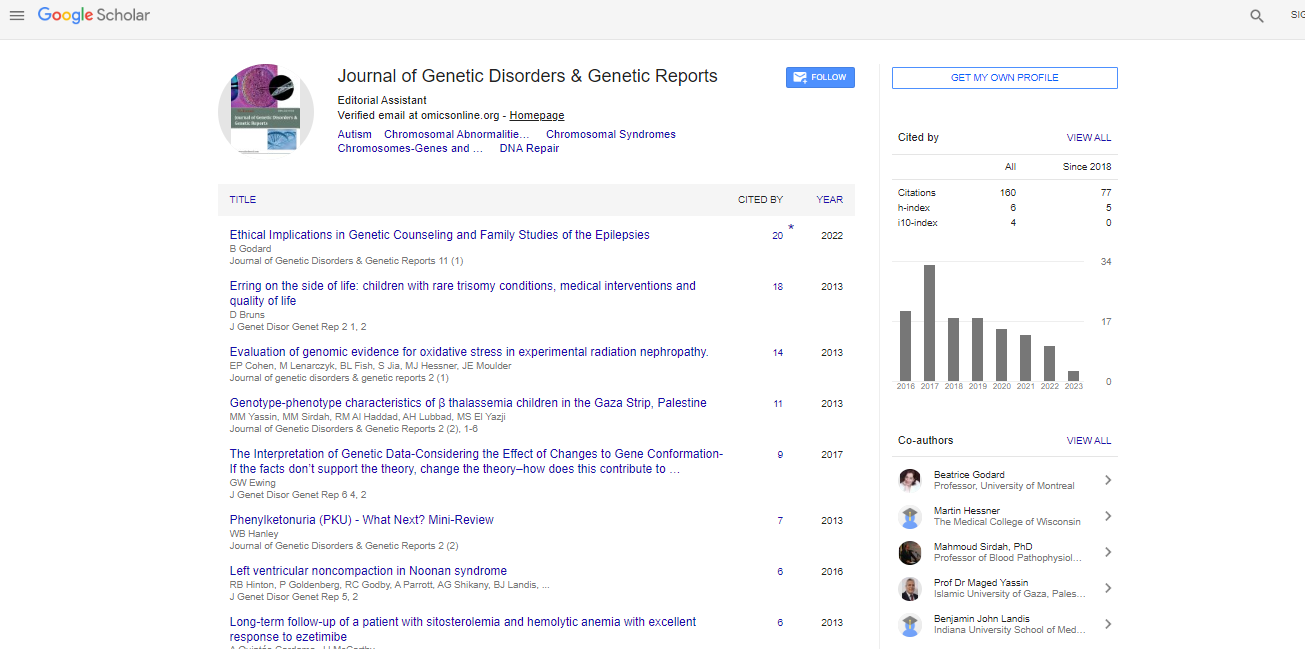Perspective, Vol: 12 Issue: 2
Emerging Technologies in Genetic Testing and Screening
Aileen Singh*
1Department of Human Genetics, Emory University School of Medicine, Atlanta, USA
*Corresponding Author: Aileen Singh,
Department of Human Genetics, Emory
University School of Medicine, Atlanta, USA
E-mail: ail.leen@singh.edu
Received date: 29 March, 2023, Manuscript No. JGDGR-23-99514;
Editor assigned date: 31 March, 2023, Pre QC No. JGDGR-23-99514 (PQ);
Reviewed date: 14 April, 2023, QC No. JGDGR-23-99514;
Revised date: 21 April, 2023, Manuscript No. JGDGR-23-99514 (R);
Published date: 28 April, 2023, DOI: 10. 4172/2576-1439.1000203
Citation: Singh A (2023) Emerging Technologies in Genetic Testing and Screening. J Genet Disor Genet Rep 12:2.
Abstract
Genetic testing and screening play a pivotal role in the diagnosis, prevention, and management of genetic disorders. Over the years, significant advancements have been made in the field of genetic testing, driven by emerging technologies that offer improved accuracy, scalability, and accessibility. This paper aims to explore the recent advancements in genetic testing and screening technologies, highlighting their potential applications and impact on healthcare.
Description
Genetic testing and screening play a pivotal role in the diagnosis, prevention, and management of genetic disorders. Over the years, significant advancements have been made in the field of genetic testing, driven by emerging technologies that offer improved accuracy, scalability, and accessibility. This paper aims to explore the recent advancements in genetic testing and screening technologies, highlighting their potential applications and impact on healthcare.
Next-Generation Sequencing (NGS) technologies have revolutionized the field of genetic testing by enabling rapid and costeffective sequencing of DNA or RNA. NGS allows for the simultaneous sequencing of millions of DNA fragments, providing comprehensive genomic information. This technology has significantly expanded our ability to identify disease-causing genetic variants and screen for a wide range of genetic disorders.
Whole Exome Sequencing (WES) is one of the most commonly used NGS approaches, focusing on the protein-coding regions of the genome. WES allows for the detection of both common and rare genetic variants associated with a wide range of genetic disorders. It has proven particularly valuable in diagnosing rare and complex diseases that are challenging to diagnose using traditional methods.
Whole Genome Sequencing (WGS) takes NGS a step further by sequencing the entire genome, including non-coding regions. WGS provides a comprehensive view of an individual's genetic makeup and offers opportunities for identifying novel disease-causing variants and understanding the functional consequences of genetic alterations. As the cost of sequencing continues to decline, WGS is becoming increasingly accessible for clinical use.
Non-Invasive Prenatal Testing (NIPT) has emerged as a powerful tool for screening genetic abnormalities in the fetus during pregnancy. Traditional prenatal screening methods, such as maternal serum screening and ultrasound, have limitations in terms of accuracy and reliability. NIPT, based on analyzing cell-free fetal DNA circulating in the maternal bloodstream, provides highly accurate information about the risk of common chromosomal abnormalities, such as Down syndrome, Edwards syndrome, and Patau syndrome.
NIPT offers several advantages over invasive prenatal diagnostic procedures, such as Chorionic Villus Sampling (CVS) and amniocentesis, which carry a risk of miscarriage. It is a safe and noninvasive procedure, reducing the physical risks associated with invasive testing. Furthermore, NIPT can be performed as early as 10 weeks of gestation, providing early and timely information for decision-making.
Single-cell sequencing technologies have emerged as a powerful tool for understanding cellular heterogeneity and investigating genetic and epigenetic variations at the single-cell level. Traditional bulk sequencing methods provide an average representation of genetic information from a population of cells, masking the genomic diversity within cell populations.
Single-cell sequencing allows for the analysis of individual cells, providing insights into cell-to-cell variability, cellular dynamics, and clonal evolution. It has applications in various fields, including cancer research, developmental biology, and neurology. In the context of genetic testing, single-cell sequencing holds promise for identifying rare genetic variants and uncovering mosaic genetic conditions that may not be detectable using traditional methods.
Clustered Regularly Interspaced Short Palindromic Repeats (CRISPR) technology has revolutionized the field of genome editing and offers exciting possibilities for genetic testing and screening. CRISPR-based technologies, such as CRISPR-Cas9, allow for precise and targeted modifications to the genome, enabling the correction of disease-causing mutations or the introduction of specific genetic alterations.
CRISPR-based approaches can be used for functional validation of genetic variants identified through sequencing. By introducing specific genetic changes in cellular or animal models, researchers can determine the functional consequences of these variants and their contribution to disease phenotypes.
 Spanish
Spanish  Chinese
Chinese  Russian
Russian  German
German  French
French  Japanese
Japanese  Portuguese
Portuguese  Hindi
Hindi 



